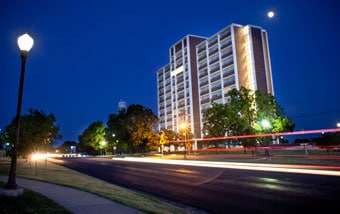Room to Grow

Whitley Hall
Towering 12 stories above campus, Whitley Hall is where many A&M-Commerce freshmen call home. Room layouts allow for double occupancy in apartment style suites, and cable, Ethernet and phone services keep students connected to the outside world. Whitley also features lounge areas
and laundry facilities on each floor.
Pride Rock
The three-story, 258-bed residence hall is designed to meet the needs of today's students. Each two-person room features a living area ideal for studying or relaxing with friends, and separate bedrooms for each student. Residents also have access to community activity spaces, outdoor courtyard seating and comfortable study lounges throughout the residence hall.
By Sydni Walker
From an 80-room wooden dormitory in 1899, to the 125-room suite-style residence hall opened in 2011, campus housing has come a long way. More than a bed, a desk and some closet space, today's dorm rooms accommodate the needs of a new kind of student, one who wants to learn outside the confines of a traditional classroom and desires to be a part of a vibrant campus community. Recognizing the need for change, the Residential Living and Learning team at A&M-Commerce has worked diligently to meet these changing needs, and provide students with new housing options.
“Right now, our plans are to build the second of what we hope will be a four-phase project,” said Dennis Koch, director of resident living and learning. “We are also hoping to do some minor renovations on some of the existing halls over the next couple of years.”
The benefits of these efforts are two-fold. Not only does living on campus improve student retention, it also improves students' overall academic success.
“Life in a residence hall is an experience and a chance for the student to be the person that they want to be,” Dennis said. “To create a complete college experience that will assist students in achieving their goals, students need to be a part of a college community; we want to help.”
Two such living and learning communities are the Regents Scholars Program and the Honors College housed in Pride Rock and Prairie Crossing respectively. Both programs train students to change the world through rigorous academic study and community engagement. The residence halls contribute to this sense of community by hosting events and study sessions that encourage interaction among students.
The Regents Scholars have lived together on campus since 2010, creating a tight-knit community within their wing of Pride Rock. Study groups and Tuesday night tutoring sessions allow the Regents to grow personally and improve academically.
“There's more to college than just getting a degree,” said Dr. Ricky Dobbs, dean of University College. “There's as much learning going on outside of class as in class. These on-campus venues for learning impact the kind of person a student will become when they leave. A college graduate who cannot relate to others is ineffective in the job market. That's why campus life matters. A wise consumer of higher education will recognize its value.”
Christine York, a resident assistant for the Regent Scholars at Pride Rock, takes advantage of the opportunities provided by living on campus.
“Someone living right down the hall from you, who is also in your classes, really helps,” Christine said. “Whether you miss class and need notes, don't understand an assignment or simply want a study partner, classmates are always close by. Sometimes I wonder if I would survive college without my fellow Regent Scholars; I couldn't imagine working or living anywhere else.” Students in the Honors College enjoy similar living and learning communities thanks to the foresight of Dr. Raymond Green, dean of the Honors College.
“We purposefully chose to house Honors College students together because we wanted to provide students with a support network from day one,” Green said. “These students have similar motivations and face similar challenges. Thanks to living and learning communities, these students can provide each other with both emotional and practical support. We believe that some learning happens ‘accidentally', when students talk about what happened in class, what piqued their interest or what confused them.”
Thanks to the close-knit communities fostered at both Pride Rock and Prairie Crossing, learning extends well beyond designated study hours, significantly impacting the academic careers of the students who reside there.
“At PC, I am surrounded by my Honors College peers. When we have a test coming up, we don't have to leave the comfort of our homes to study together,” said Richelle Brown, an Honors College student. “Living together has made studying easier, and our grades definitely benefit.”
University College
University College provides entering students access to guidance and services necessary for success at the university and throughout their lives. It promotes the university vision of becoming a premier regional university through the application of high academic standards, provision of high quality programs and a personal educational experience for each of our students. The program works to provide a transformative experience for all students that will make them better scholars, better citizens and more dedicated alumni.
Honors College
Honors College provides honors scholars opportunity for a more in-depth curriculum and establishes a residential learning community. The Honors College curriculum includes 30-credit hours that students from all majors can undertake. These students and the honors office are housed in the Prairie Crossing Apartment Complex.
Regent Scholars
The Regents Scholars program provides outstanding freshmen a four-year scholarship roughly equivalent to full tuition. It allows students to pursue a bachelor's degree in their chosen field while developing their awareness of international issues and cultural contrasts. The program also provides students with leadership training and experience that will allow them to have a positive impact upon the lives of others on campus, and in their future profession. Thirty students are admitted to the program each year.
- ||



